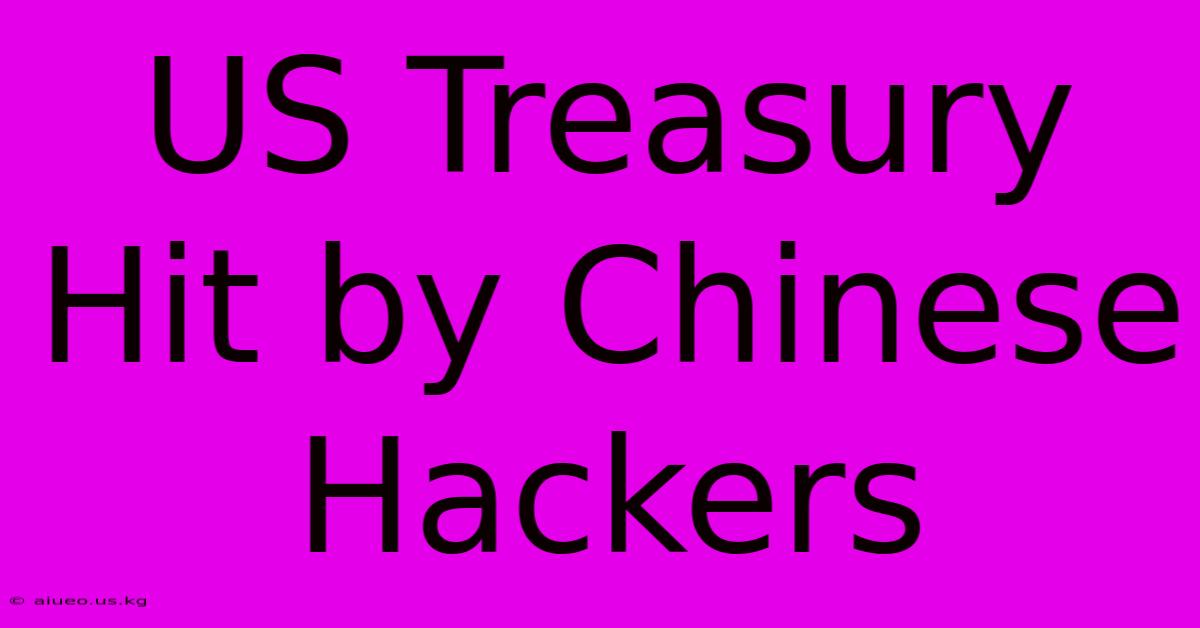US Treasury Hit By Chinese Hackers

Discover more detailed and exciting information on our website. Click the link below to start your adventure: Visit Best Website xxxxxx.xxxx. Don't miss out!
Table of Contents
US Treasury Hit by Chinese Hackers: A Deep Dive into the SolarWinds Attack and its Implications
The cybersecurity landscape is constantly evolving, and recent events highlight the persistent threat posed by state-sponsored actors. One of the most significant breaches in recent years involved the US Treasury and other federal agencies, allegedly targeted by Chinese hackers exploiting the SolarWinds Orion platform. This incident underscores the critical need for robust cybersecurity measures and international cooperation to combat these threats.
Understanding the SolarWinds Attack
The SolarWinds attack, discovered in late 2020, involved the compromise of the SolarWinds Orion software, a widely used network management platform. Hackers, believed to be linked to the Chinese government, infiltrated the update process, inserting malicious code into Orion updates. This allowed them to gain access to the networks of numerous organizations that used the software, including the US Treasury, Department of Commerce, and National Institutes of Health.
The Scope of the Breach
The sheer scale of the breach is alarming. Thousands of organizations were potentially affected, representing a significant risk to national security and sensitive information. The attackers' ability to remain undetected for months highlights the sophistication of their techniques and the challenges in detecting advanced persistent threats (APTs).
The Methods Employed
The attackers used a variety of sophisticated techniques, including supply chain attacks, to compromise the SolarWinds Orion platform. Supply chain attacks target vulnerabilities in the software supply chain, allowing attackers to compromise a large number of organizations at once. This approach makes detection and response significantly more challenging. The use of living-off-the-land binaries (LOLBins) and other advanced evasion techniques further complicated efforts to identify and contain the breach.
The Implications for the US Treasury and National Security
The compromise of the US Treasury carries significant implications for national security and economic stability. The attackers potentially gained access to sensitive financial data, potentially impacting economic policies and national security. The breach also raised concerns about the potential for intellectual property theft and sabotage.
Impact on Financial Markets
The potential for manipulation of financial markets through access to sensitive financial data is a significant concern. The attackers could have used the information to gain an unfair advantage or destabilize markets.
Damage to International Relations
The attack has further strained US-China relations, highlighting the growing tensions between the two nations in the realm of cybersecurity. The incident underscores the need for increased international cooperation to combat state-sponsored cyberattacks.
Strengthening Cybersecurity Defenses
The SolarWinds attack serves as a stark reminder of the need for organizations to strengthen their cybersecurity defenses. Here are some key steps that organizations can take:
Implementing Robust Patch Management
Regularly updating software and applying security patches is crucial to mitigating vulnerabilities. Organizations need to have a robust patch management system in place to ensure that all software is up to date.
Employing Multi-Factor Authentication (MFA)
MFA adds an extra layer of security, making it more difficult for attackers to gain unauthorized access. Implementing MFA across all systems is a critical step in enhancing cybersecurity.
Enhancing Threat Detection and Response Capabilities
Organizations need to invest in advanced threat detection and response capabilities to identify and respond to cyberattacks quickly and effectively. This includes employing security information and event management (SIEM) systems and security orchestration, automation, and response (SOAR) tools.
Strengthening Supply Chain Security
Organizations need to carefully vet their software suppliers and ensure that their supply chains are secure. This includes conducting due diligence on vendors and implementing robust security controls throughout the supply chain.
Conclusion: A Call for Collective Action
The US Treasury attack, perpetrated through the SolarWinds breach, is a wake-up call. The sophistication and scale of this attack highlight the evolving nature of cyber threats and the need for a proactive and collaborative approach to cybersecurity. This requires not only stronger individual defenses but also improved international cooperation to hold malicious actors accountable and prevent future attacks. The fight against state-sponsored cyberattacks is a global challenge that demands a concerted, multi-faceted response.

Thank you for visiting our website wich cover about US Treasury Hit By Chinese Hackers. We hope the information provided has been useful to you. Feel free to contact us if you have any questions or need further assistance. See you next time and dont miss to bookmark.
Featured Posts
-
Le Bron James 4 Decade Nba Player
Dec 31, 2024
-
Iowa Vs Missouri Odds 2024 Music City Bowl
Dec 31, 2024
-
Tonights Black Moon See It
Dec 31, 2024
-
Black Moon In Los Angeles
Dec 31, 2024
-
Live Ipswich Town Vs Chelsea Premier League
Dec 31, 2024
